The 2025 State of AI in B2B Video
Powered by Goldcast
Table of Contents
- This report covers:
- About the data
- Key trends and insights: AI in video marketing
- The growing role of AI in B2B marketing strategies
- The importance of video in B2B marketing
- The use of AI for video production and repurposing
- Budget allocation and cost impact of AI in video
- Challenges in scaling video production with AI
- Future adoption of AI tools for video strategy
- Capture and scale your brand’s story with AI + video
Video marketing pioneer Michael Litt said it best: “The play button is the most compelling call to action on the web.” Video is one of the most effective ways to convey messages and connect with audiences—but it’s notoriously resource-intensive.
That is, until now. AI is making it possible to cut video production time in half, without blowing your budget on external contractors and outsourcing.
This report sheds light on how B2B marketers are using AI to enhance video production for content marketing. As AI continues to evolve, its impact on marketing strategies, particularly video content, is growing. This research highlights trends, challenges, and successes in the adoption of AI for video marketing.
This report covers:
- Key trends and insights
- The growing role of AI in B2B marketing strategies
- The importance of video in B2B marketing
- The use of AI for video production and repurposing
- Budget allocation and cost impact of AI in video
- Challenges in scaling video production with AI
- Future adoption of AI tools for video strategy
- Additional resources
About the data
The State of AI in B2B Video Report is based on a survey of over 500 B2B marketers working at SMB, mid-market, and enterprise companies. The online survey was fielded in November 2024 and uses a sample with diverse representation across company sizes and roles, including a balanced mix of C-level executives, directors, managers, and individual contributors.
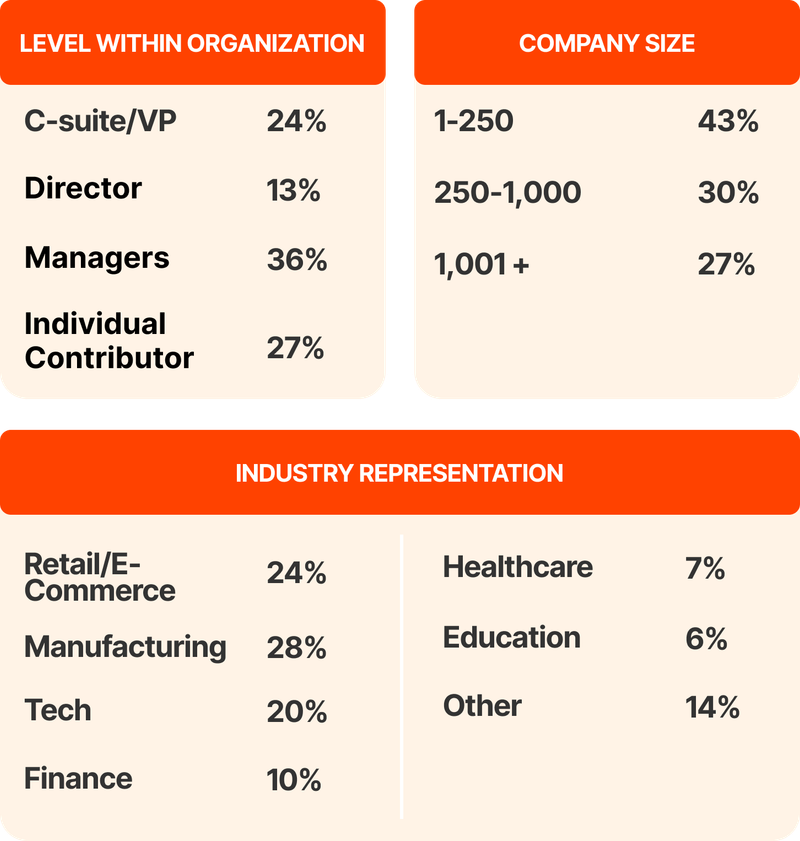
Key trends and insights: AI in video marketing
If you came for the stats, you won’t be disappointed. We’ll share plenty of numbers for the data nerds out there. But before we dive in, here are the overarching trends and insights revealed in our research.
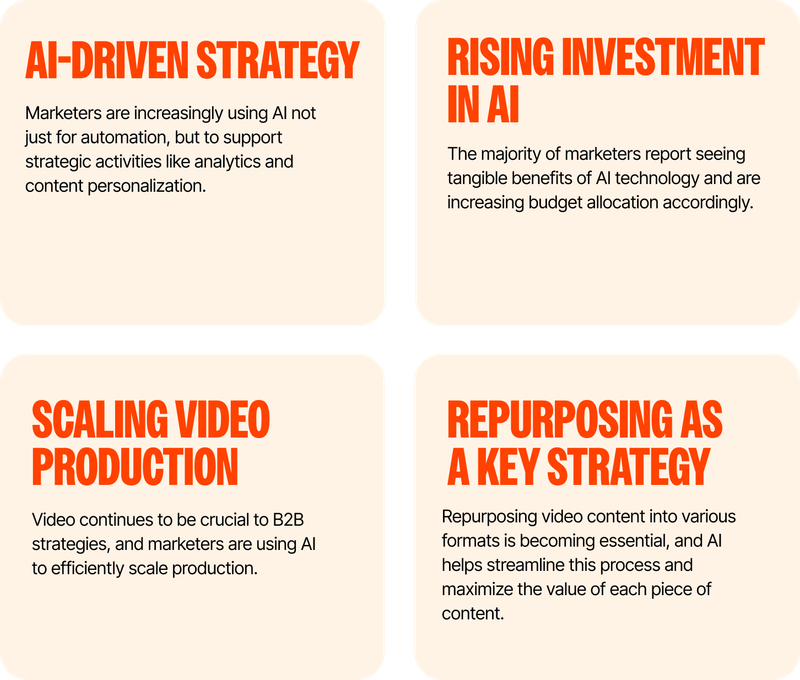
Tldr; AI will be integral to the video strategies of tomorrow. And now that we’ve set the stage, let’s get down to the data.
The growing role of AI in B2B marketing strategies
AI is quickly becoming a cornerstone in B2B marketing, with a notable impact on video content and beyond. While some marketers still harbor reservations about all this new technology, its ability to drive efficiency has led to widespread adoption.

- 91% of respondents say they are currently using AI tools in their marketing strategy, particularly for content creation (60%), reporting (51%), and email marketing (49%).
- 77% of marketers report that AI has provided the highest value in content creation, followed by reporting (59%), video production (50%), and content repurposing (48%).
- 84% believe AI will be critical to achieving their marketing goals in the next 1-3 years.
Discover what you can do with Goldcast Content Lab for free today.
Which AI-supported activities provide the highest value for marketers?
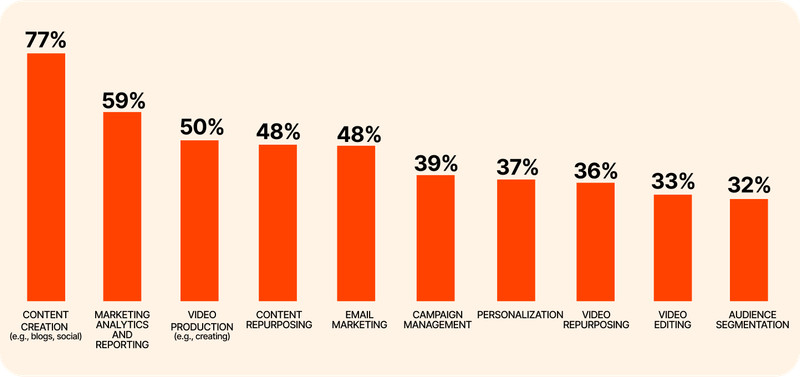
What’s keeping marketers from using AI?
Despite pervasive adoption, 9% of marketers report not using AI at all. These respondents cite a wide range of reasons for avoiding AI, including:
- Perceived lack of need
- Personal or philosophical choice
- Uncertainty or ambiguity
- Lack of knowledge or skills
- Company policies or restrictions
- Data entry errors
- Error or miscommunication
- Lack of familiarity
Several of these reasons boil down to the reality that mainstream AI technology is still new—and that newness can create some (often well-founded) suspicion, especially in areas like video production where creativity is central to success.
As one respondent put it: "We believe AI is not able to tell OUR story the way it needs to be told."
Alone, AI cannot deliver the nuance, emotion, and care your brand stories deserve. These tools are only as successful as the human wielding them and providing their inputs.
AI in action: How MAICON generates same-day session notes
MAICON, or the Marketing AI Conference, is an event where marketing professionals converge for a deep dive into the latest strategies and use cases for artificial intelligence. While planning their most recent conference, the MAICON team was looking to enhance attendee engagement by providing valuable content in real-time.
To tackle this, it only made sense to enlist the help of AI. MAICON used Goldcast to automatically capture and deliver key insights from each session to participants same-day. This application improved the attendee experience and operational efficiency for the team.
Unlocking New Possibilities: The Power of AI and Small Teams:
Using YouTube to Drive Sales and Create Content for MACON Events:
How AI Transformed a Four-Person Marketing Team into a Global Leader, Dan Slagen - MAICON 2024:
Paul Roetzer Opening Keynote: The Road to AGI - MAICON 2024:
The importance of video in B2B marketing
Video is an essential format for B2B, with a wide range of uses across the marketing function. With an impressive 97% of marketers incorporating video into their strategies, it’s a medium that truly transcends traditional content boundaries.
More than ever, we’re seeing marketers acknowledge the vitality of video and plan for even more video production next year. This respondent summed it up:
Video content is valuable because it captures attention quickly and enhances engagement, making it more effective for conveying messages. It also boosts brand visibility and can increase conversions through dynamic, shareable formats.
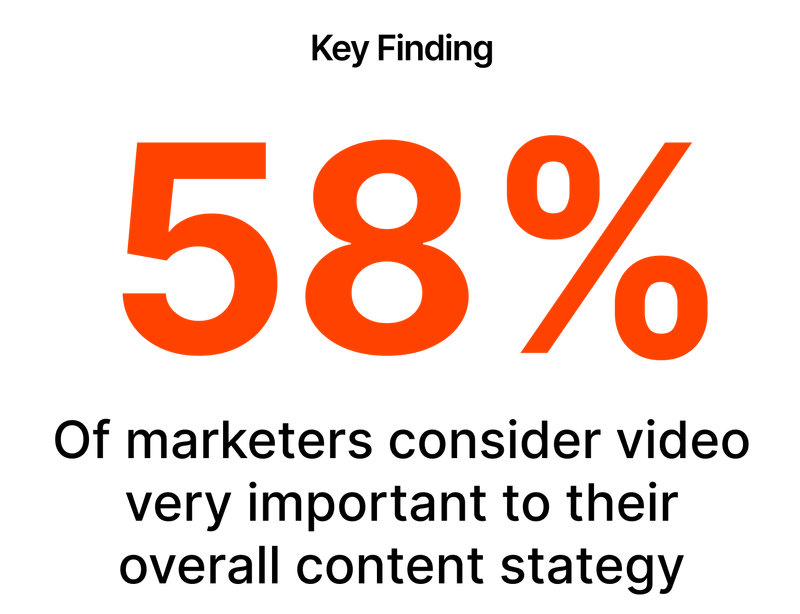
- 89% of respondents say video is "very important" (58%) or "somewhat important" (31%) in their overall content strategy.
- More C-suite executives said video was important to the company’s content strategy (94%) compared to managers (89%) and individual contributors (82%).
- 73% of marketers plan to increase video production in 2025 by at least 10%.
- 88% of respondents redistribute video content across channels like social media (87%), landing pages (46%), and email campaigns (44%).
Try out Content Lab for free today and see how you can transform your video production.
Importance of video according to various roles
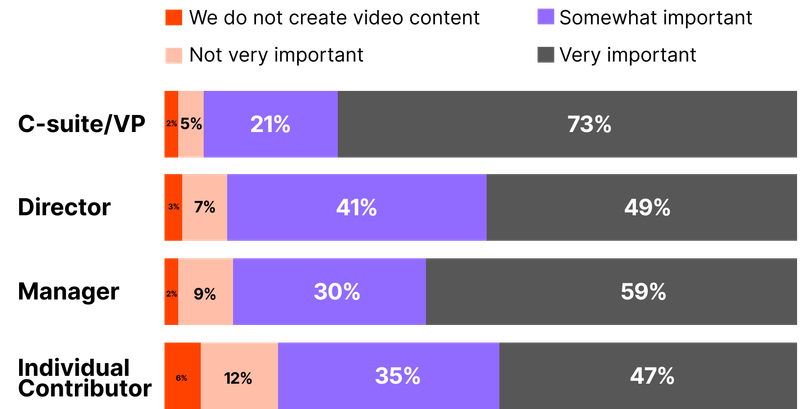
📌 Pro tip: Repurposing video content
Take your video content’s impact to the max by repurposing it into social media snippets, blog posts, and email campaigns. You’ll not only extend its reach, but also ensure messaging consistency across platforms.
The use of AI for video production and repurposing
The importance of video is rising. The value of AI is rising. It only makes sense that our next stop is…
Video 🤝 AI
How are marketers incorporating AI into their video production workflows and what kinds of benefits are they seeing?
In short, they’re automating repetitive, tedious tasks so they can focus on strategy and creativity. Projects like slicing long-form footage into shorter clips and generating transcripts can be done with AI, saving significant time.
This increased efficiency has opened doors for marketers to create way more assets from one video, including social posts, emails, blog posts, and more.
One respondent explained: “The efficiency gained from AI in our video workflows is incredible—it saves us hours, and the quality of output is consistently high.”
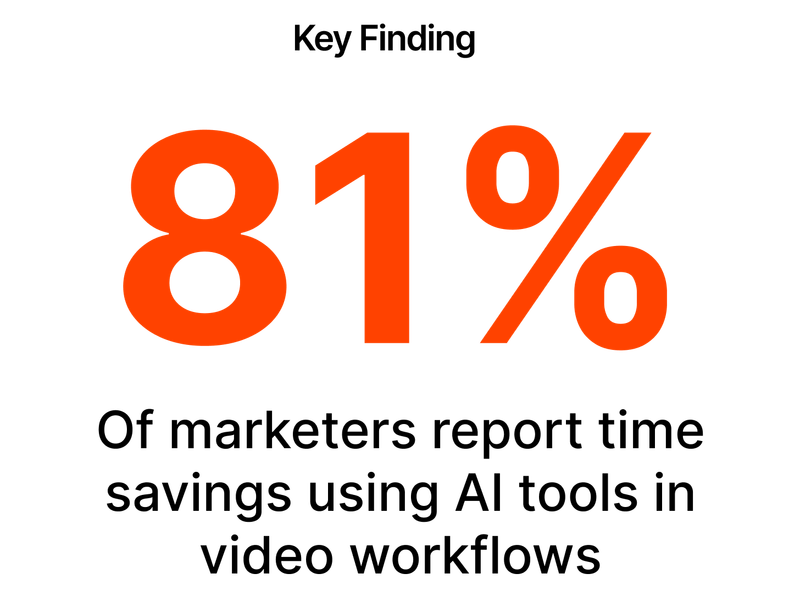
- 88% of respondents use AI for tasks such as automated video editing (43%), transcriptions/captions (42%), and generating clips (41%).
- 83% report using AI to create written content from video.
- 86% say AI could save them time in the video production process.
- More than 40% of marketers say AI has saved them at least three hours in tasks like editing or creating video content.
- 90% of respondents are repurposing video content into other assets such as social media posts (77%), email campaigns (42%), and blog posts (36%).
- However, at least 43% are missing opportunities to repurpose video from webinars and virtual events.
- 79% of respondents believe that AI tools have allowed them to repurpose video content more efficiently.
How much time does AI save marketing teams?
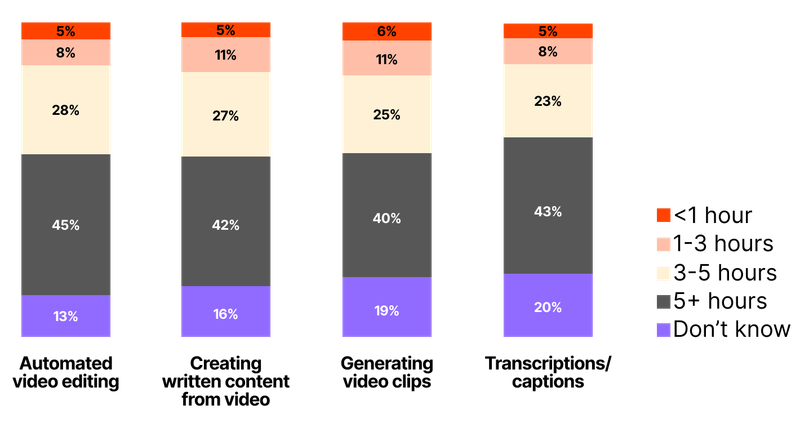
What content types are marketers repurposing video content into?
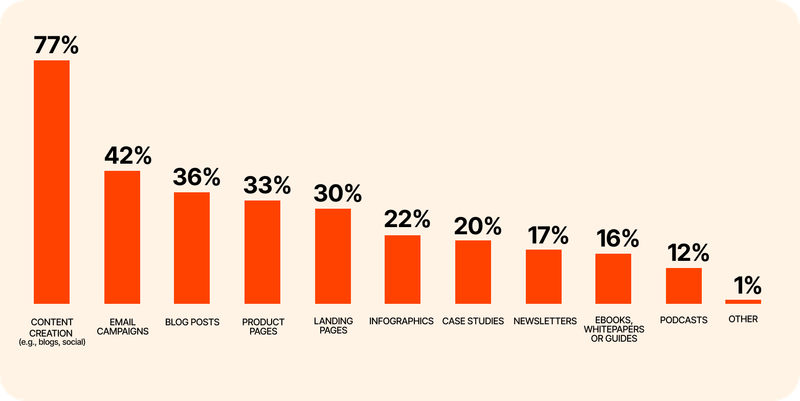
📌 Pro tip: Automating production tasks
Automating tedious tasks like transcription and snippet slicing can free up your creative energy for strategy and innovation. Think of AI as your always-on assistant.
Automate video production and repurposing with Content Lab’s AI
With Goldcast Content Lab, you can automate portions of your video production and repurposing processes.
Save time and resources, and even boost creativity, by using AI to generate social snippets, blog posts, and emails from your video content. No manual watching and re-watching required. Plus, Content Lab helps you maintain brand consistency across assets and platforms.
We understand that video production can be a labor of love. With Content Lab, you’ll keep it light on the labor and heavy on the love.
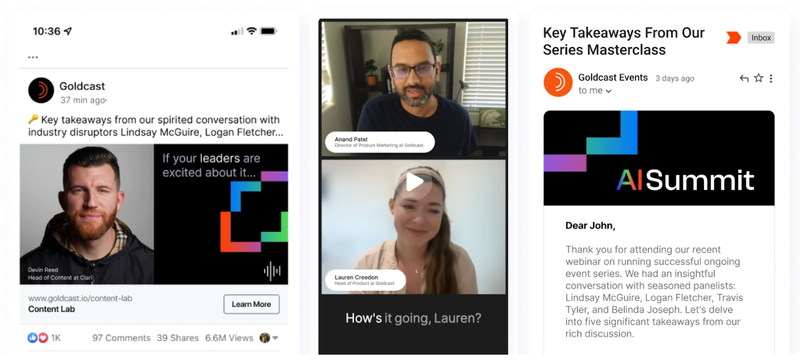
Budget allocation and cost impact of AI in video
Of course, the best AI tools aren’t free. They require an investment—which, in turn, requires leadership’s buy-in. That’s why proving the ROI of this tech is crucial.
Luckily, the value of saving time and resources isn’t hard to convey. AI helps marketers automate easy tasks and reduce their reliance on outsourcing to external parties—leading to a more strategic budget allocation.
Take it from this respondent: “The cost savings from AI adoption have been a huge relief, freeing up funds that we can now use to enhance our marketing strategies and explore new opportunities.”
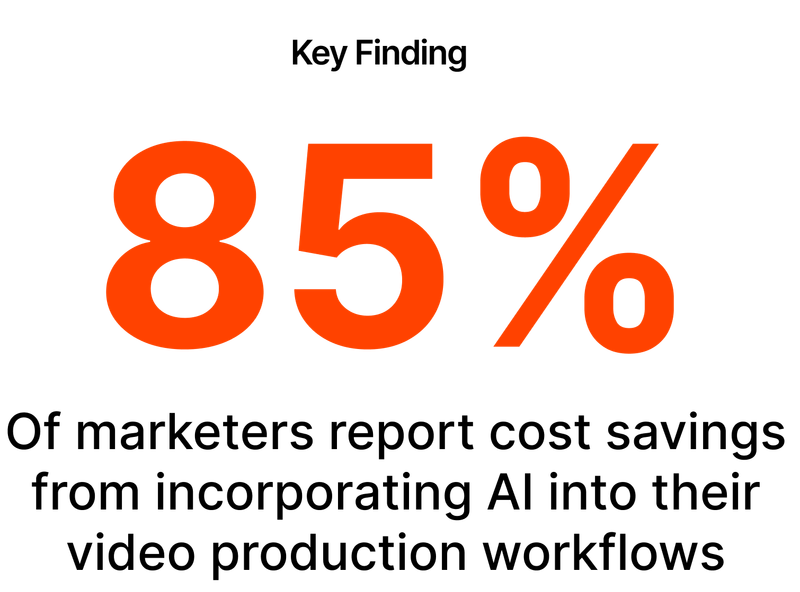
- 50% of respondents allocate between 10-25% of their marketing budget to video production.
- 34% cite high costs as the main barrier to adopting AI.
However…
- 85% of marketers say they saved significant costs on video production after incorporating AI tools.
- 74% say AI-powered tools have reduced their need to outsource video production to agencies or freelancers.
- Outsourcing still remains common for high-skill tasks like filming (60%) and post-production (55%).
What percentage of the marketing budget is allocated to video?
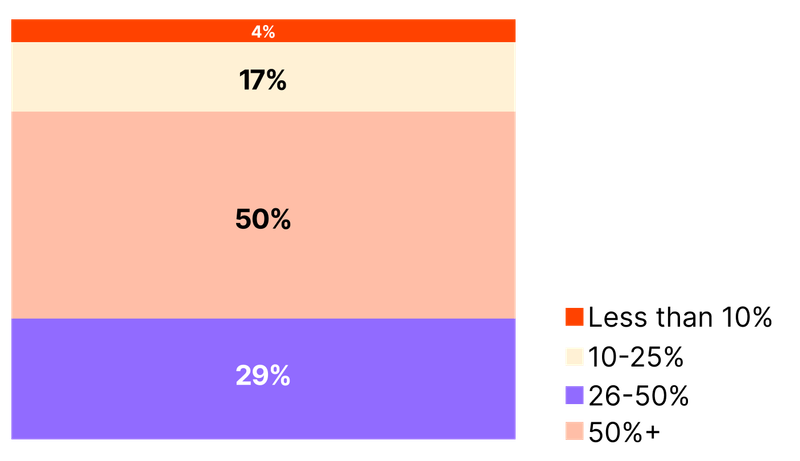
📌 Pro tip: Reducing dependency on outsourcing
Incorporating AI into your workflow can reduce dependency on external resources. This not only helps you do more with your budget, but also gives your team a better capacity to innovate and pivot more quickly.
Challenges in scaling video production with AI
When it comes to scaling video, resource constraints are the big challenge—that’s budget, time, and people. Based on what we know so far, AI seems to be the perfect solution to this challenge.
However, despite AI’s clear potential, using it to scale video efforts remains challenging for some marketers. The noise and hype around AI have been very real the past couple of years. It can be hard to figure out where to focus and how to get the most out of the tech you invest in.
Marketers realize—accurately—that you can’t just ask ChatGPT to write a blog post from your video transcript and expect quality output. Successfully working AI into your processes takes expertise, something many respondents feel their teams still lack.
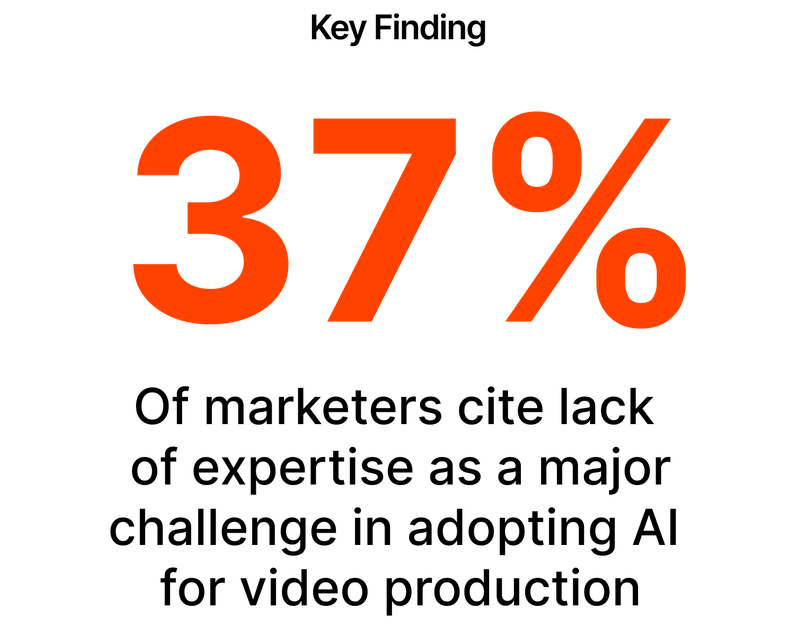
- 36% of respondents say video takes too much time to scale and 35% say the size of their production team limits their ability to scale.
- 37% of respondents say a lack of expertise is the main thing preventing them from adopting AI for video production, followed by high costs (34%), and limited tool availability (29%).
Top challenges preventing marketing teams from using AI for video production
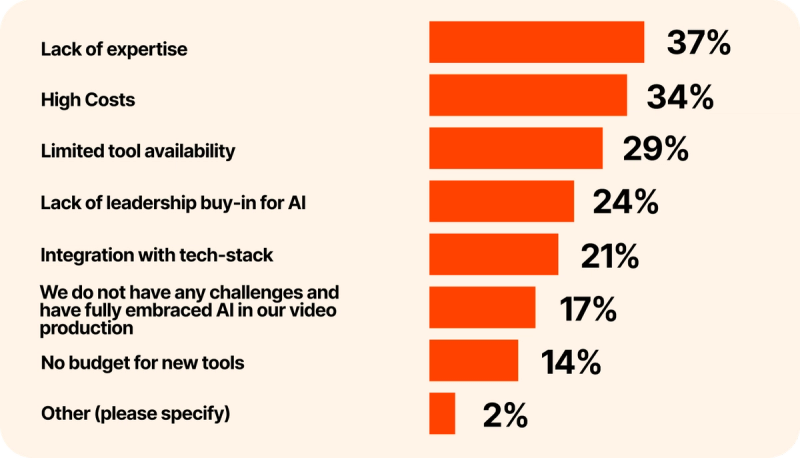
Overcoming challenges: How AspenCore saves two hours per post-event video snippet with AI
What does it look like, then, to successfully integrate AI into your video production workflow? The team at AspenCore was spending hours creating video snippets after every virtual event. With AI-powered video tools, they slashed that time by two hours per snippet.
Kristen Nuñez, Global Event Manager, explains how AI helped her feel less stressed and more confident about video production:
Before I felt like I was very out of my league. But now I feel like it makes it so easy. It doesn't make me feel like I'm video editing now, I just feel like I'm putting together a portion of my event and it doesn't seem like I'm doing something out of my wheelhouse.
Future adoption of AI tools for video strategy
If you take one thing away from this report, let it be this: The future of video is intertwined with AI. 🔮
Many marketers plan to adopt more AI video tools in the next few years—a trend driven by an ongoing quest for better personalization and higher engagement.
Interestingly, medium-sized companies lead the way in increasing investments in AI tools. Marketing team size is key here. These teams have enough budget and people to explore AI tech—and they’re not large enough to easily scale their video programs without it.
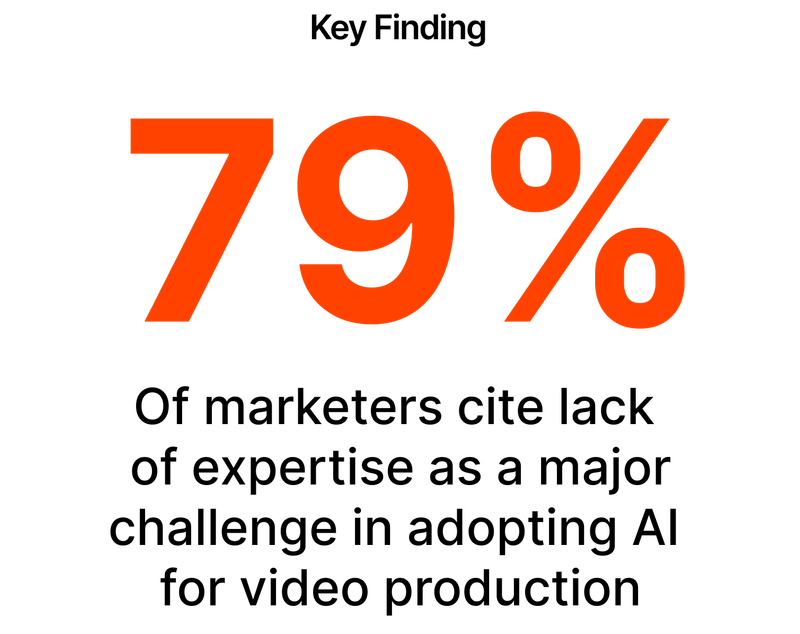
- 79% of respondents say they plan to invest more in AI tools in the next 1-3 years.
- Medium-sized companies are more likely to plan on investing more (86%) than either large companies (83%) or small companies (71%).
- 53% say the most valuable AI capability for their future video strategy would be automated editing, followed by generating clips (49%) and video analytics (41%).
📌 Pro tip: Investing in AI tools
Stay ahead of the curve by seeking to invest in AI tools that improve engagement, personalization, and efficiency. Be willing to experiment and learn—it’s all part of the journey to creating a better buyer experience.
Capture and scale your brand’s story with AI + video
Like it or not, AI is reshaping how companies reach their audiences with video. These tools are empowering marketers to create more engaging and personalized content with fewer resources. AI brings simplicity to complex video production workflows, which lets marketers focus on creative messaging and high-level strategy.
Looking ahead, it’s not a question of if but when you’ll incorporate AI into your video marketing strategy. And, of course, how. As AI tools continue to evolve, the how will, too.
But one thing is clear when it comes to AI in video marketing: The only way to gain expertise, prove ROI, choose the right tools, and earn leadership buy-in… is to embrace it. Marketers who approach AI with curiosity and an opportunity mindset will be rewarded with improved efficiency and expanded creativity.
And, we’re confident you’ll have a little fun along the way.
Stay In Touch
Platform
Resources
Company
© 2026 Copyright Goldcast, Inc. All rights reserved.
YOUR PRIVACY CHOICES


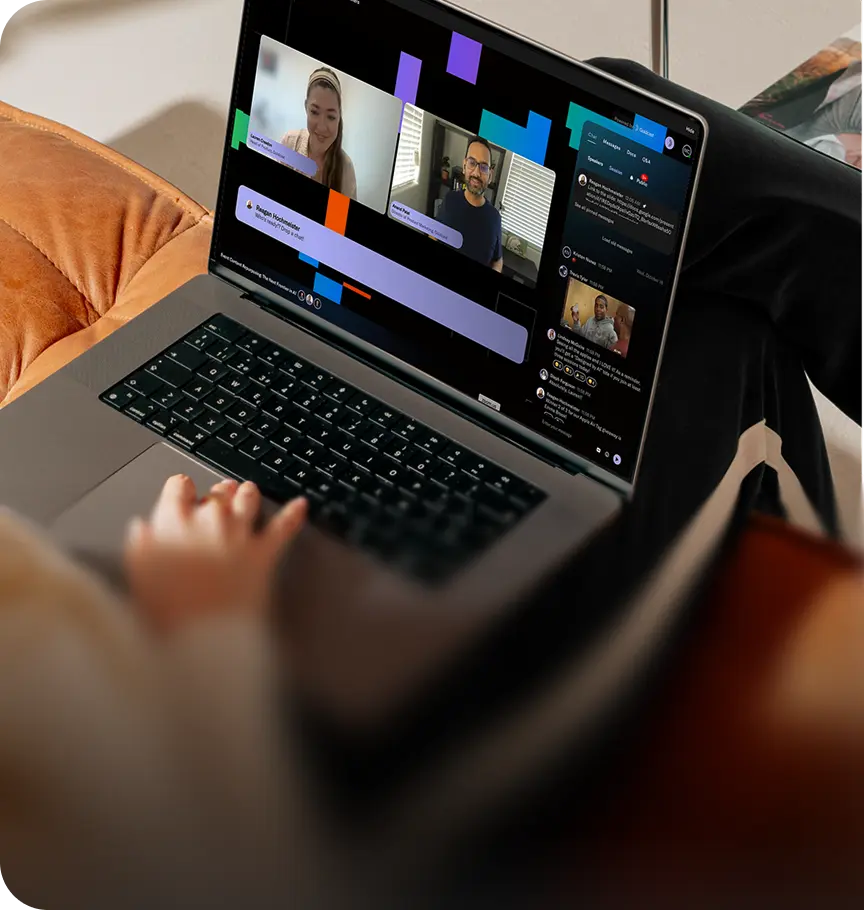

 Upcoming Events
Upcoming Events Event Series
Event Series On-Demand Events
On-Demand Events

